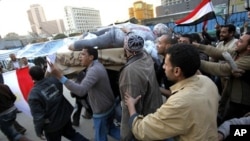The political upheaval in Egypt and other Arab nations has created regional instability that threatens efforts to revive peace talks between Israel and the Palestinians. But top officials of countries supporting peace negotiations are urging a resumption of the talks, saying they are important for stability and security in the Middle East.
Protecting Israel
Speaking recently before parliament, Israeli Prime Minister Benjamin Netanyahu said in the near history of the Middle East, Islamic extremists have taken advantage of rapidly changing political climates to take control and establish anti-democratic regimes.
Mr. Netanyahu told lawmakers Islamic hardliners in Iran, Hezbollah in Lebanon and the Palestinian group Hamas in the Gaza Strip participated in elections to solidify power. He said Israel must ensure this does not happen again.
Israel is particularly concerned about Egypt's Muslim Brotherhood. While officially banned and purposely taking a backseat in the current protests, it is considered the best organized opposition group in Egypt.
Target of rage
Demonstrators in Cairo have focused their anger on Egyptian President Hosni Mubarak, but some Israeli analysts are concerned that rage could one day be aimed at Israel.
"There is a concern that hostility towards the regime will be conflated with hostility towards Israel or the United States and that the fallout of political regime change will be a more aggressive, hostile and militant policies with respect to Israel. That is the concern," explained Mark Heller, a senior research associate at the Institute for National Security Studies in Tel Aviv.
Israeli-Palestinian peace talks, launched in Washington last September, quickly broke down over Israel’s decision not to extend a moratorium on construction of Jewish settlements in East Jerusalem and the West Bank.
Palestinian concerns
Palestinians have refused to return to negotiations without a settlement freeze.
While uncertainty lies ahead, Palestinian political analyst Mahdi Abdul Hadi says Israeli officials need to understand the Arab uprising may change long-held assumptions about the peace process.
"The Israeli society today, they are living on a different planet," Abdul Hadi said. "They do not see the change. They do not see the winds. They do not understand the pulse of the street. All what they are concerned [about] is their security. For us, the Palestinians, we have come to see this is an historical moment."
Rapid change
One thing many Palestinians and Israelis are both concerned about is the unpredictability of any new Egyptian government if change comes too quickly.
"Judging on the Egyptian front is kind of difficult because we have many fears that Islamic [Muslim] Brotherhood organization would take over and have more influence, which will negatively affect the peace process in general and stability in the Palestinian Territories," said Dimitri Diliani, the Palestinian Fatah Party spokesman in East Jerusalem.
But the Israelis and Palestinians are not giving up on the peace process.
Hopeful measures
Last Friday, Israel announced a package of steps designed to encourage economic growth and develop infrastructure in the Palestinian territories.
Prime Minister Netanyahu, apparently referring to the protests rocking Egypt, said the offers where designed to enhance stability by improving the Palestinians quality of life.
The proposals were offered the day before a meeting of high-level officials from countries belonging to the Middle East Quartet, consisting of the United States, Russia, the United Nations and the European Union.
Mr. Netanyahu unveiled the offer alongside the Quartet’s special envoy, former British prime minister Tony Blair.
"I think we can work together with you and the Palestinians to have concrete developments in the field," Netanyahu said. "At the same time I think we need to work with the United States and the international community to find a route that will give us a horizon to a historic peace agreement between Israel and the Palestinians - two states for two peoples."
Palestinians rejected the Israeli proposals, calling for all parties to recognize a Palestinian state.
Resumption encouraged
A Quartet statement noted the dramatic events in Egypt, saying the group considered the implications of the uprising for Arab-Israeli peace.
Mr. Blair said even against the backdrop of events in the region, resuming peace negotiations is still possible.
"Even though obviously there have been difficulties in the process, which we all know about, I think there is still a huge amount of determination and good will to try to make sure we reach a solution and a historic peace," Blair said.
The Quartet statement said further delay in the resumption of negotiations is detrimental to prospects for regional peace and security.
Analyst Mark Heller predicts uncertainty will prevail, at least in the short run.
"The question, of course, that preoccupies everyone, is how is all this is going to turn out and unfortunately none of us is really endowed with the gift of prophesy," he said.
Analysts say the peace process is likely to be on hold for the immediate future, as both sides deal with the ramifications of the tumultuous events in Egypt and elsewhere in the Middle East.
Mideast Peace Timeline

















